5 foods you should never cook in a cast iron skillet – here are the fascinating reasons why
The cast iron commandments you need to know before you start using your cast iron skillet
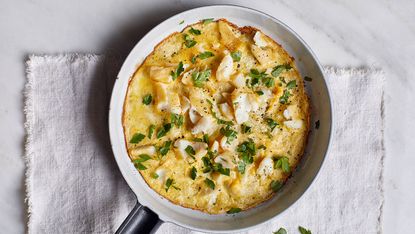

Your kitchen is not complete without a trusty cast iron skillet for day-to-day recipes. Cast iron offers some of the best-unparalleled heat retention, natural, non-stick properties that only get better with use, and provides one of the best sears for meats to the perfect golden crusts in the oven.
However, while the best cast iron skillets are, no doubt, durable, did you know that there are certain foods that you should never cook in a cast iron skillet? There are some foods that can potentially damage your cast iron skillet and negatively impact its lifespan.
Nevertheless, cooking any of these foods would be one of the mistakes you’re making with your cast iron skillet, and where possible, you will want to keep them out of the pan.
Foods you should never cook in a cast iron skillet
If you want to ensure that your cast-iron skillet remains in pristine condition, here are the five foods you should keep out of your cast-iron skillet at all costs. But, like with most things, there are always a few caveats.
1. Fish
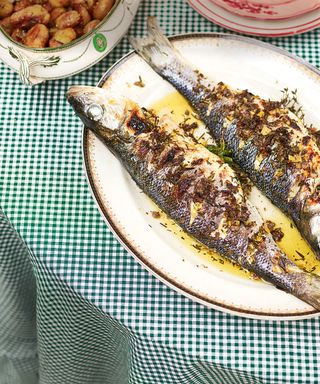
Cast iron skillets, and the best-cast iron cookware, are incredibly versatile, but certain ingredients should be prepared with alternative cooking tools or appliances.
This one likely comes as no surprise, but flaky fish fillets, particularly delicate varieties, are not well-suited for your cast iron skillet. Even if you're skilled enough to flip your fillets without incident, chances are the skin will not make it through the process. The same can be said for tougher varieties of fish, too. Unless your pan is very well seasoned, stick to your nonstick fry pan or oven for the best results.
2. Eggs
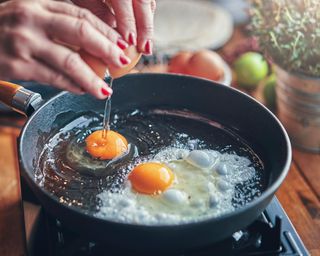
Eggs, especially scrambled, are a breakfast staple, but you may wish to think twice before cracking them into your cast iron skillet. Why? If your pan is not well-seasoned, your eggs could end up being a bit of a mess. Not only will they stick to the pan, but the clean-up will also be undesirable. And we all know that over-washing your pan can remove its seasoning.
However, if you do have a well-seasoned skillet and you know how to season a cast iron pan to perfection, then you may be safe from the dreaded 'ugly omelet' curse. There’s a good reason why manufacturers produce cookware specifically for omelets. That 100-percent nonstick surface makes it easy to pull off perfect eggs, every single time.
3. Tomatoes
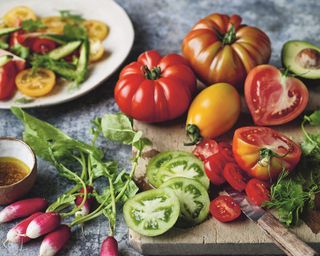
There is something oh-so comforting about a long-simmered tomato sauce, but acidic foods, like tomatoes, should never be marinated over a long period of time in a cast iron pan. As tomatoes break down, metallic flavors from the pan will leach out into the sauce.
If you must cook tomatoes, be quick, experts advise. Do not leave them cooking in the cast iron skillet for longer than necessary, and avoid using them in a brand-new or unseasoned pan.
If making marinara sauce is a favorite for your family and friends, then choose from the best non-stick pans, such as a stainless steel option instead.
4. Acidic food
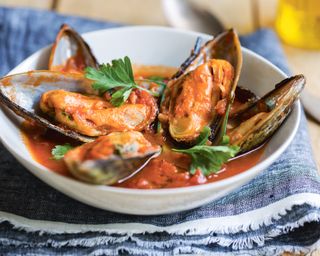
Much like with tomatoes, other acidic food is a no-go in a cast iron skillet. The primary issue is the damage this can cause to the pan itself. The acidic properties are known to wear away the non-stick layer of seasoning, leaving the pan vulnerable to rust. The other issue is that cooking anything particularly acidic will cause iron to trickle into your food. This would not usually pose a health hazard, but no one wants to endure that metallic aftertaste in their food.
5. Foods that smell
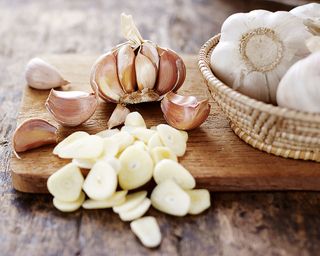
Cast iron is commonly known to hold onto the smells of what we cook, so if you like preparing pungent food, like fish, cheese, and garlic, be prepared for this smell to linger on your cookware. The main problem is that these aromatic ingredients can all leave a lasting impression on this porous metal. As a result, the quality of the next dish could be negatively impacted.
If you do wish to cook pungent food, then experts suggest buying two skillets, one for sweet and the other reserved only for savory food. The last thing you, or your guests, want is for your dessert to taste like garlic.
Of course, knowing how to clean a cast iron skillet the right way will help to ensure this essential cook’s companion lasts for many years to come. To deodorize a cast iron skillet, simply heat it in the oven, while empty, at 400°F for 10-15 minutes.
FAQs
Should I buy a cast iron skillet?
A cast iron skillet is a versatile pan that can be used for cooking everything from cookies and omelets to meat and vegetables. 'Cast iron skillets and pans are excellent for cooking as they heat food evenly whether on the stove or in the oven. If you buy a good quality one and look after it well, it can last you for life,' says James Devonshire, head of the Cookery School at Daylesford.
As long as your skillet is properly seasoned – using oil and heat – it will be the ideal non-stick cooking surface and seal food beautifully. However, while it is desirable to build up the pan's seasoning over time, overzealous cleaning or using it to cook the wrong food can ruin your pan.
What pan should I use instead of cast iron?
Many of us fixate on using the 'right' cooking equipment to get the best result in the kitchen. While it is crucial to use the right tools, there is wiggle room in the market for your personal preference. Ideally, we’d all use cast iron grills or flat skillets, but these can be heavy, and deglazing is a no-no in a cast iron pan. Carbonsteel skillets are a great option; they are lighter than cast iron but just as robust.
Are you up-to-date on your cast-iron skillet pan know-how? To be sure your pan stays in tip-top condition, take note of all our advice.
Sign up to the Homes & Gardens newsletter
Decor Ideas. Project Inspiration. Expert Advice. Delivered to your inbox.

Jennifer is the Digital Editor at Homes & Gardens. Having worked in the interiors industry for a number of years, spanning many publications, she now hones her digital prowess on the 'best interiors website' in the world. Multi-skilled, Jennifer has worked in PR and marketing, and the occasional dabble in the social media, commercial and e-commerce space. Over the years, she has written about every area of the home, from compiling design houses from some of the best interior designers in the world to sourcing celebrity homes, reviewing appliances and even the odd news story or two.
-
 How to shop Wayfair like a style editor – 5 tips to find the best pieces and the unmissable deals
How to shop Wayfair like a style editor – 5 tips to find the best pieces and the unmissable dealsWith Way Day on the horizon, a style editor shares the best tips to shop the Wayfair sales, as well as the best products to buy
By Nikhita Mahtani Published
-
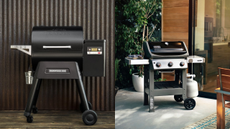 Smokers vs gas grills – which is best?
Smokers vs gas grills – which is best?There's a lot to consider when it comes to smokers vs gas. As a grilling expert, I asked barbecue pros which is the best
By Alex David Published